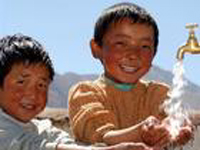Some 1.8 million rural residents have gained access to safe drinking water over the past two years in
Gansu Province, but more than 10 million others still subsist on dirty water or face shortages, statistics show.
Starting 2006, the Gansu provincial government earmarked 850 million yuan (US$116 million) for programs to provide tap water for people living in rural areas who had been collecting rain for household use, Yao Jinzhong, of the Gansu provincial department of water resources, said.
"We helped each rural household build a small water reservoir to collect rain, but that water usually turned bad after a while," Yao said.
"Besides, rain is not a reliable source of water during droughts."
The provincial government also solved water shortages in extremely dry areas such as Huanxian, Huining and Jingyuan counties last year, benefiting 200,000 residents.
"Water was too precious in the past. We couldn't afford to take a bath all year round, and we had to wait for rain in order to do washing," Wang Xiaoxia, a resident of Daping village, Lintao county, said.
"Now that we've got running water, we can wash whenever we want," she said.
But providing safe drinking water to a further 10.7 million rural residents, nearly 60 percent of the population in remote parts of the arid province, remains a challenge.
Of them, half are reduced to drinking unclean water that does not meet national safety standards, while the rest suffer from shortages or difficulties in securing water supplies.
Separately, the neighboring Ningxia Hui Autonomous Region, which also has a dry climate and frequent water shortages, is to invest 200 million yuan in a program to provide clean and safe drinking water for 300,000 rural residents this year.
By the end of 2015, the region will solve drinking water problems for 1.36 million rural people and gradually provide tap water to each village, authorities have said.
(Xinhua News Agency January 11, 2008)






